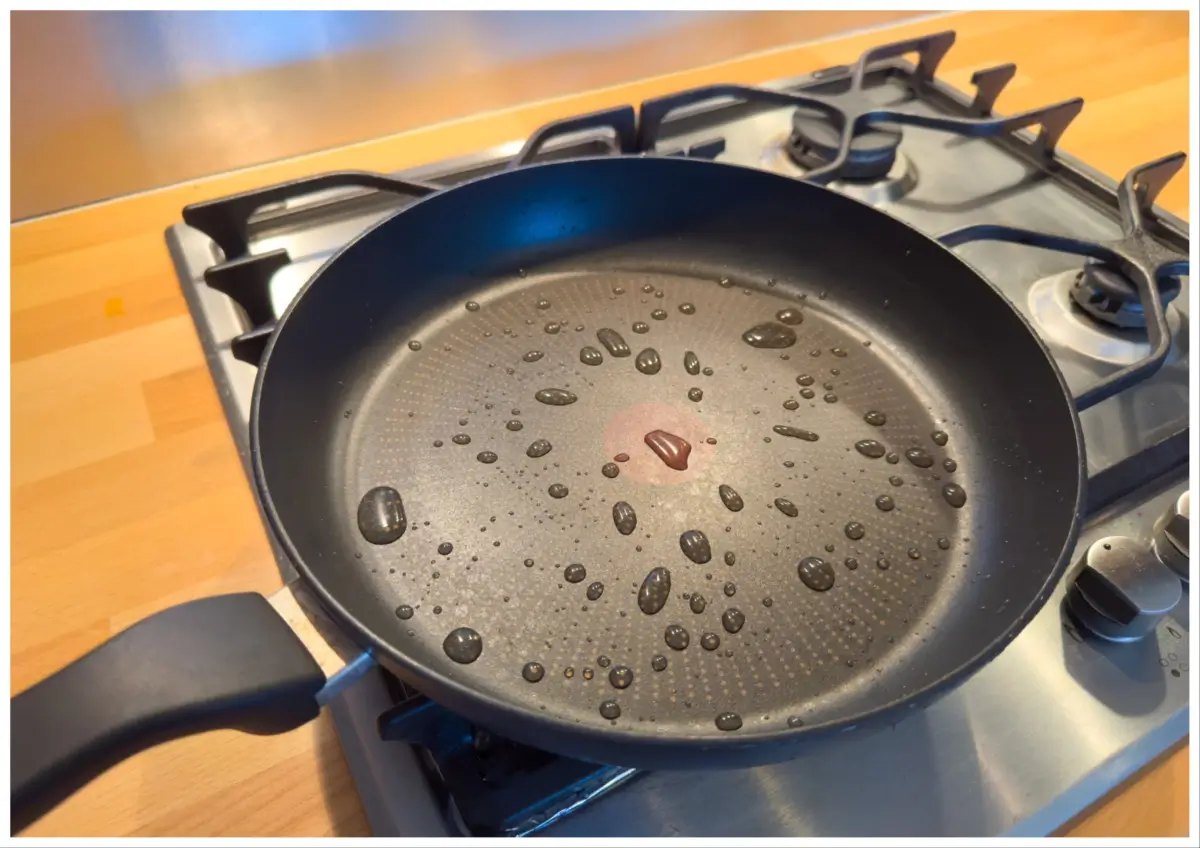You’ve Already Been Exposed to Toxic PFAS. But You Can Take Steps to Minimize Future Exposure.
"Forever chemicals" are everywhere, but people aren’t powerless. Here are expert recommendations for how to decrease your risk of exposure.
You’ve Already Been Exposed to Toxic PFAS. But You Can Take Steps to Minimize Future Exposure.
"Forever chemicals" are everywhere, but people aren’t powerless. Here are expert recommendations for how to decrease your risk of exposure.

Nonstick pans are a source of PFAS exposure.by Shutterstock
Per- and polyfluoroalkyl substances, commonly abbreviated as PFAS or “forever chemicals,” are ubiquitous. They have also been associated with debilitating health impacts, such as cancer, birth defects, liver disease, kidney disease and more. This can make it overwhelming to know what can be done to protect yourself from the far-reaching effects of these substances. Even though scientists estimate that PFAS are present in the blood of 97 percent of Americans, that doesn’t mean that people are helpless. We’ve assembled some proven ideas from experts and advocates for how to decrease your personal risk, look out for your community and create change.
“When faced with that immensity of a problem, you’ve got to really focus on, ‘Well, what can I control?’” said Natalie Balbuena, researcher with Food & Water Watch, in a recent webinar. “There are a lot of key tools that I think begin with awareness.”

Educate yourself and your community
Although it sounds simple, educating yourself about PFAS can lead to real change. Dana Sargent, executive director of Cape Fear River Watch, has been working with community members to test home wells for PFAS. These conversations can be devastating, she says, when people with sickness in their families find out that the water they’ve been drinking is contaminated. For a lot of people who learn about their exposure, the next step is telling other people they know.
“A lot of these folks that have come to know about this are sharing with their neighbors,” says Sargent. “And that is vitally important, because education is the first step towards policy change.”

Case in point: There have been a lot of restrictions on who qualifies to get their well water tested in North Carolina. Sargent has been pushing for a pullback on these restrictions, and as more community members learned about the issue, they began contacting the North Carolina Department of Environmental Quality (NCDEQ) as well to voice their concerns.
Just this December, NCDEQ announced that it is pulling back restrictions, allowing thousands more people to get their well water tested—a big win, says Sargent.
“Action does effect change,” says Sargent. “We’ve got to beat it with a frickin’ heavy hammer in this town and in this state, but it does work.”
The documentary The Devil We Know is one good place to start. It provides a thorough look into the history of PFAS and how it affects human communities.
Utilize your buying power, if possible
There’s no doubt about it—being able to be selective about where you spend money is an economic privilege. Systemic factors like this make certain communities disproportionately impacted by PFAS contamination. This is a justice issue, because non-contaminated products should not be accessible only to the wealthy.
“This is definitely an environmental justice issue,” says Balbuena of Food & Water Watch, “primarily because it really connects to a lot of the historical injustices when it comes to placing low-income communities of color next to certain chemical-producing, plastic-producing [and] fracking sites and just having them exposed to all these toxins and then being left with not only paying for the development of those things but also a lot of health effects.”
For those who are financially able, the Center for Environmental Health provides a list of PFAS-free products including textiles, foodware and more. Another accessible list that includes cosmetics, baby products and furniture is available here.
Voicing priorities to companies is also effective, even if you can’t use your dollars in a certain way. It can change company behavior.
“There are companies starting to respond and you can start to get some PFAS-free products,” said Kyla Bennett, director of science policy for Public Employees for Environmental Responsibility (PEER), in the Food & Water Watch webinar. Lowe’s took PFAS out of its indoor residential carpets. IKEA removed it from its processing. “I think those are some victories that we can take heart from.”
Limit plastics and other known dangers
Products containing PFAS won’t be labeled as such, and we do not yet have labeling requirements for products claiming to be free of PFAS. When it comes to products labeled PFAS-free, Bennett cautions that you have to be careful of greenwashing. Sometimes, one PFAS may be removed from a product just to be replaced with another. Look into the company’s verification process, if possible.
Still, there are some things that you can assume contain PFAS. Bennett recommends avoiding #2 plastics as much as possible. This could be food containers, shampoo bottles and the like. Waterproof items, such as mascara and rain gear, can also be sources of exposure.
Another known danger is nonstick cookware. “Get rid of your Teflon pans,” says Sargent. “Obviously, if you get rid of it, you’re putting it into a landfill, it’s going to end up back in the system in some way. But like, don’t cook on that garbage.”
Know where your drinking water comes from
About 20 percent of exposure to PFAS comes through drinking water. One thing you can do, says Bennett, is look for certified filters to reduce PFAS loads in your home. Under the sink reverse osmosis is effective, but can be costly to the individual household. It also requires maintenance by the homeowner, which can make it difficult for renters.
“Reverse osmosis is very expensive,” says Emily Sutton, Haw Riverkeeper for the Haw River Assembly. “And that’s an environmental justice issue to say that only the wealthiest of us can have safe drinking water.”
Knowing where your water comes from is important, says Sutton. Last year, in response to the PFAS contamination in the Haw River that was contaminating Pittsboro’s drinking water, the town installed a granular activated carbon filtration system. This effectively removes the majority of the PFAS from the town’s drinking water.

Be vocal
The EPA recently withdrew its conditional consent for the chemical company Chemours to import waste containing PFAS to its North Carolina location, stating that the agency initially received inaccurate data from the company. Sargent believes the reversal is largely thanks to the fact that local residents have become such strong voices on this topic.
“We pushed back hard and they’re like, ‘We can’t do this to that community. They’re paying attention,’” says Sargent. “That’s huge.”
Follow us
This work is licensed under a Creative Commons Attribution-NoDerivatives 4.0 International License.
Want to republish a Modern Farmer story?
We are happy for Modern Farmer stories to be shared, and encourage you to republish our articles for your audience. When doing so, we ask that you follow these guidelines:
Please credit us and our writers
For the author byline, please use “Author Name, Modern Farmer.” At the top of our stories, if on the web, please include this text and link: “This story was originally published by Modern Farmer.”
Please make sure to include a link back to either our home page or the article URL.
At the bottom of the story, please include the following text:
“Modern Farmer is a nonprofit initiative dedicated to raising awareness and catalyzing action at the intersection of food, agriculture, and society. Read more at <link>Modern Farmer</link>.”
Use our widget
We’d like to be able to track our stories, so we ask that if you republish our content, you do so using our widget (located on the left hand side of the article). The HTML code has a built-in tracker that tells us the data and domain where the story was published, as well as view counts.
Check the image requirements
It’s your responsibility to confirm you're licensed to republish images in our articles. Some images, such as those from commercial providers, don't allow their images to be republished without permission or payment. Copyright terms are generally listed in the image caption and attribution. You are welcome to omit our images or substitute with your own. Charts and interactive graphics follow the same rules.
Don’t change too much. Or, ask us first.
Articles must be republished in their entirety. It’s okay to change references to time (“today” to “yesterday”) or location (“Iowa City, IA” to “here”). But please keep everything else the same.
If you feel strongly that a more material edit needs to be made, get in touch with us at [email protected]. We’re happy to discuss it with the original author, but we must have prior approval for changes before publication.
Special cases
Extracts. You may run the first few lines or paragraphs of the article and then say: “Read the full article at Modern Farmer” with a link back to the original article.
Quotes. You may quote authors provided you include a link back to the article URL.
Translations. These require writer approval. To inquire about translation of a Modern Farmer article, contact us at [email protected]
Signed consent / copyright release forms. These are not required, provided you are following these guidelines.
Print. Articles can be republished in print under these same rules, with the exception that you do not need to include the links.
Tag us
When sharing the story on social media, please tag us using the following: - Twitter (@ModFarm) - Facebook (@ModernFarmerMedia) - Instagram (@modfarm)
Use our content respectfully
Modern Farmer is a nonprofit and as such we share our content for free and in good faith in order to reach new audiences. Respectfully,
No selling ads against our stories. It’s okay to put our stories on pages with ads.
Don’t republish our material wholesale, or automatically; you need to select stories to be republished individually.
You have no rights to sell, license, syndicate, or otherwise represent yourself as the authorized owner of our material to any third parties. This means that you cannot actively publish or submit our work for syndication to third party platforms or apps like Apple News or Google News. We understand that publishers cannot fully control when certain third parties automatically summarize or crawl content from publishers’ own sites.
Keep in touch
We want to hear from you if you love Modern Farmer content, have a collaboration idea, or anything else to share. As a nonprofit outlet, we work in service of our community and are always open to comments, feedback, and ideas. Contact us at [email protected].by Lena Beck, Modern Farmer
December 20, 2023
Modern Farmer Weekly
Solutions Hub
Innovations, ideas and inspiration. Actionable solutions for a resilient food system.
ExploreShare With Us
We want to hear from Modern Farmer readers who have thoughtful commentary, actionable solutions, or helpful ideas to share.
SubmitNecessary cookies are absolutely essential for the website to function properly. This category only includes cookies that ensures basic functionalities and security features of the website. These cookies do not store any personal information.
Any cookies that may not be particularly necessary for the website to function and are used specifically to collect user personal data via analytics, ads, other embedded contents are termed as non-necessary cookies.
Yes. We should reduce use of teflon coated pans, plastic materials etc., but to what to extent is still not forth coming.
Yes. We need to cut back on plastics, teflon-coated cookware, and other such items, but the exact amount is still unclear.